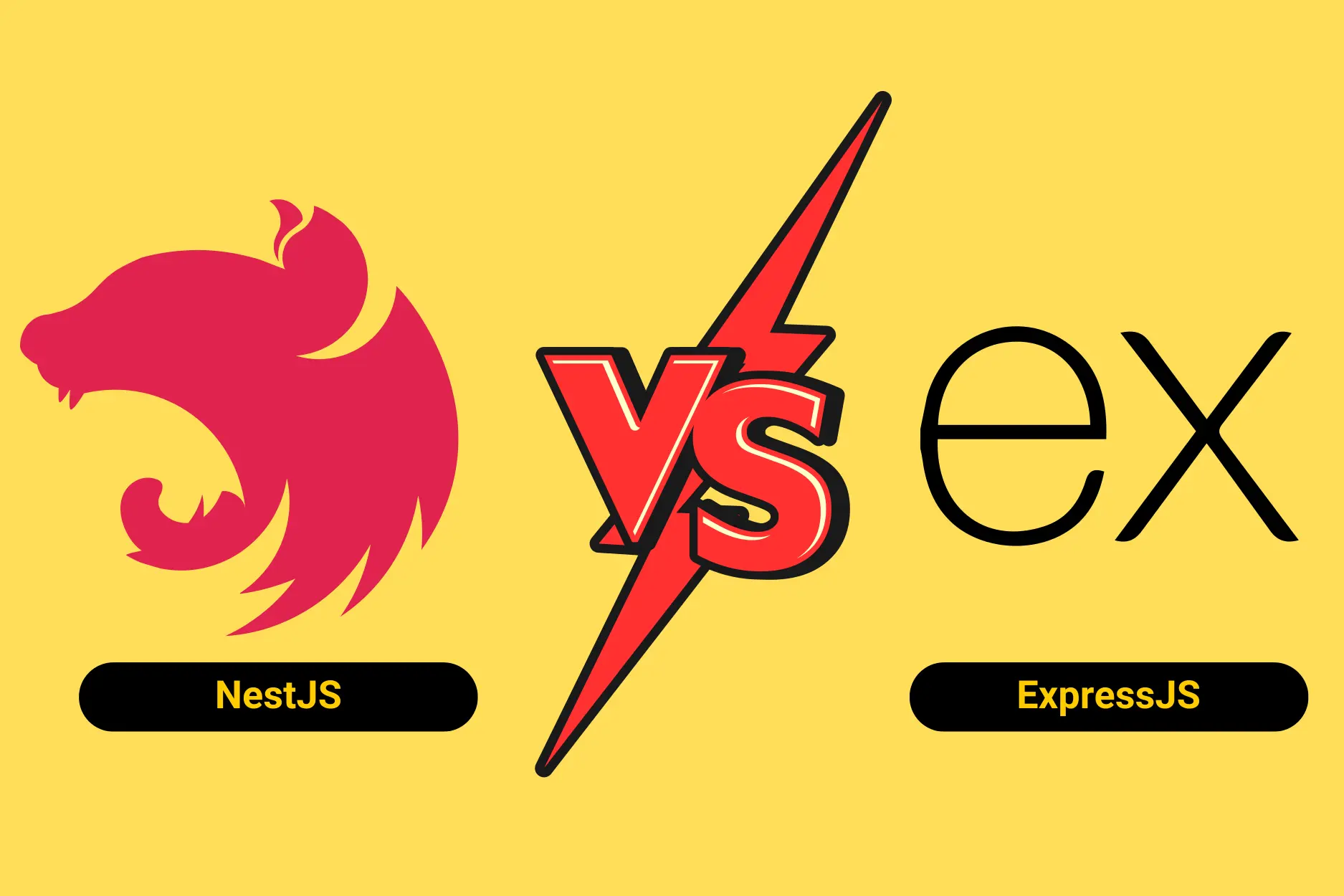NestJS vs ExpressJS: How to Choose the Right Framework?
Do you intend to develop a web application? NestJS vs ExpressJS: which one will you use?
ExpressJS has emerged as the industry standard for online application development in recent years. It is quick, adaptable, and simple. Nonetheless, developers frequently use lightweight frameworks when creating large-scale apps. NestJS is becoming more and more well-known as a result.
Two of the most widely used Node.js frameworks available today are Nest and Express. You must first understand each of their characteristics and variations before you can decide which one to select. Don't worry if you are unfamiliar with both. We shall take a simple approach first.
What is Nest.js?
Nest.js is a powerful Node.js framework for creating server-side apps. Because it is built on TypeScript and JavaScript, developers are likely to be familiar with this option. Because Nest.js draws influence from Angular, developers who are already acquainted with Angular will see many overlaps between the two frameworks.
Nest.js provides a collection of fundamental elements, including controllers, modules, providers, and middleware, to aid in the application's organization and structure. These essential elements support Nest.js's functionality and architectural style, giving programmers the resources they need to build dependable and expandable server-side applications. Nest.js is platform-agnostic, meaning it may be used with any Node HTTP framework.
A major advantage of adopting Nest.js is that it makes use of the vast Express environment. This enables developers to benefit from Nest.js's disciplined design and organization while utilizing Express's rich capabilities and community support.
NestJS's Advantages
The following are advantages that Nest JS provides while creating apps.

1. Modules
Applications in NestJS are constructed using modules. Upon creating a new application, the AppModule is automatically included. The many components of your program are categorized into modules to organize them. Therefore, a distinct division of interests is employed in the creation of NestJS.
2. Tight Authentication
Because RestJS doesn't rely on middleware, it provides stronger system permission and application authentication. This framework's Guards feature permits access to routes in accordance with authorization and authentication techniques such as roles, permissions, ACLs (Access Control Lists), etc.
3. Simple testing
Nest.js's module-centric architecture makes app testing simple. It is simple to design distinct automated tests that evaluate the many features or characteristics of the application's modules. Included with it is Jest, a well-liked framework for unit testing JavaScript applications.
4. TypeScript
NestJS is built on TypeScript, which enables developers to create high-quality apps by preventing mistakes early in the app development process. Developers utilize TypeScript's capabilities, including IntelliSense, editor support, and type safety, to alleviate the burden of identifying problems during code development rather than compilation.
5. Quick Development
It offers a useful framework with modules that make it simple and quick for developers to create apps. Therefore, whether you want to create an MVP or a whole app, development is quick.
Examining the distinctions between NestJS and ExpressJS can help you decide which is better for your web development project.
6. Combining Different Technologies
Nest JS has all these features, so you can connect to a database, GraphQL API, or both. Nest.js works well with other technologies, allowing you to link APIs or databases easily.
7. Tooling & documentation
The Nest.JS framework offers better documentation with concise rules and illustrations. In addition, it provides tools for the Command Line Interface, or CLI, to run tests and create scripts, increasing developer efficiency.
[ Also Read - Why Agile Methodology is Essential for High-Quality Mobile App Development ]
What is Express.js?
Building online and mobile apps is common with Express.js, a well-liked Node.js web framework. It is a layer that sits above Node.js and helps developers with server and route management. The MVC (Model-View-Controller) architecture paradigm, which Express.js adheres to, enables developers to divide the functionality of their applications into discrete components.
One of Express.js's primary characteristics is its vast capability. For jobs like request/response control, routing, and serving static files, the framework offers a large selection of tools and modules. A strong routing system built into Express.js also makes managing many URLs and their corresponding states simple. Because of this, programmers may create dynamic web pages that maintain the application's state.
The support for template engines provided by Express.js is another noteworthy feature. Developers can use HTML templates on the server side to generate dynamic content for web pages with template engines.
Express.js is a flexible framework with a wide range of functionality for creating online and Custom mobile apps and Custom web software, developers frequently use it because of its MVC design, routing mechanism, middleware capability, layer on top of Node.js, and support for template engines.
Express.js Advantages
Express JS is the preferred option for web application development projects due to its many benefits, including its lightweight nature. Its importance may be seen in the following reasons.

1. Achievement
Express.js seamlessly integrates with Node.js, preserving its fundamental characteristics to allow developers to fully utilize both frameworks. As a result, Express and Node.js enable developers to create the highest-performing online applications.
2. Easygoing
Express.js is a simple framework, and simplicity is one of its key characteristics. This makes it simple to integrate into web development projects, as it requires less setup time and little configuration.
3. Rich Ecosystem
Many of the fundamental features required to construct web solutions are abundant in ExpressJS. It includes debugging, several template engines, and middleware.
4. Adaptability
It is an adaptable web framework that facilitates simple adjustments. It is therefore suitable for a variety of web development solutions and simple to expand upon when necessary. Express can handle any kind of online solution, no matter how big or little.
5. Simple Directioning
Express.js is an easy-to-use and effective routing system that handles HTTP requests and specifies pathways for your online application or API. These pathways specify what to do in response to a particular HTTP request.
A crucial component of your application is routing, which gives the client the resources it needs to fulfill a user's request. The Express.js framework makes routing easier to maintain and lets developers design unique routes and parameters.
6. HTTP utility methods
The Express.js framework provides res.send(), res.redirect(), res.json(), req.params, and req.query, among other methods, to handle HTTP replies and requests. This technique expedites the process of responding. It retrieves query parameters and extracts route parameters.
7. Library integration
Express.js can be easily integrated with Node.js frameworks and libraries. Developers can use pre-existing solutions for several jobs thanks to this connection. For example, it may be used with other libraries, like Knex.js, Sequelize, Mongoose, etc. For better authentication, it may also be coupled with middleware frameworks.
[Also Read - Tailwind vs Bootstrap: Which CSS Framework is Right for Your Project? ]
Key Differences: Nest.js vs Express.js
Let us now examine the key features of both frameworks so you can better appreciate their distinctions.
| Feature | NestJS | ExpressJS |
|---|---|---|
| Architecture | Structured & modular MVC | Minimal & un-opinionated |
| Dependency Injection | Powerful, built-in | No built-in support |
| TypeScript Support | Built with TypeScript | Supports TypeScript (optional) |
| Middleware | Allow middleware | Allow middleware |
| Database Integration | Built-in ORM | No built-in ORM |
| Validation | Built-in validation | Manual implementation |
| Scalability | Best for large and small-scale | Flexible for multiple applications |
| Authentication | Built-in authorization & authentication | No built-in authentication |
| Error Handling | Centralized error handling | Manual error handling |
1. Opinionated & Unopinionated
Making wise decisions while experimenting with Node.js backend development requires a grasp of the differences between frameworks. We will examine the main differences between Express.js and Nest.js in this section, with particular attention to opinionated versus unopinionated methods, architecture, performance, and popularity.
The way that Nest.js and Express.js handle opinionation is one of their main differences. Nest.js is a framework with strong opinions that follows the "convention over configuration" philosophy. It offers a set of guidelines and standards that programmers should adhere to while creating apps. This method standardizes the development process and lessens the need for explicit setup.
Conversely, Express.js is a neutral framework that offers programmers total control and adaptability while creating code. Since it doesn't impose any rules or standards, developers are free to explore and alter their apps as necessary. This may be useful for seasoned developers who would rather have more control over the project design and code structure.
Express.js provides more flexibility than Nest.js in terms of that kind of freedom. Although this flexibility could be useful for some applications, it can also lead to a haphazard code structure and make the program more difficult to maintain as it gets more complicated.
2. Nest.js vs Express.js Performance
Node.js, Nest.js, and Express.js provide excellent speed while developing server-side applications. Express.js is renowned for its ease of use and effectiveness, enabling you to carry out several tasks concurrently. The ability to develop asynchronously improves your apps' overall performance.
Conversely, by default, Nest.js processes requests using the Express framework. Express is a well-liked and extensively used HTTP framework that offers good speed for developing online apps. However, Nest.js also provides the option to move to another HTTP framework, Fastify, which is renowned for its speed and scalability.
Developers can choose between Express.js and Nest.js according to their tastes and performance needs. Both frameworks provide strong solutions to satisfy your application's performance requirements, regardless of your preference for simplicity, asynchronous programming, or scalability.
3. Nest.js vs Express.js Architecture
Nest.js offers developers a well-defined architecture by adhering to the concepts of modularity and separation of responsibilities. It promotes the usage of controllers, providers, and modules, which aid in structuring and organizing the logic of the application. Developers may simply manage dependencies and separate features by breaking the code up into independent modules.
This methodology fosters reusability and maintainability by enabling autonomous development of each module and its plug-in integration into other application components. While providers are in charge of managing the data and business logic, controllers deal with incoming requests. Nest.js guarantees a tidy and well-organized codebase by segregating the application's many levels.
Conversely, Express.js does not impose any particular architecture. It gives programmers the flexibility to organize their code in any way they see suitable. Because it makes it simple for developers to adjust to project needs, this flexibility might be advantageous for smaller projects or experimental reasons.
Even though Express.js does not have specific constraints, developers may still arrange their code using best practices like the Model-View-Controller (MVC) paradigm. However, inconsistencies in the code might develop in the absence of the imposed structure, making it more difficult to maintain the program as it becomes more sophisticated.
Nest.js provides an architecture that is well-organized and structured, encouraging maintainability and reusability. It promotes the usage of controllers, providers, and modules to improve the organization of the code. Contrarily, Express.js offers code structure freedom but lacks rigid constraints that might result in inconsistent code. Which of the two frameworks you prefer—a clear architecture or the ability to organize code in any way you see fit—will determine which way to go.
4. Nest.js vs Express.js Popularity
ExpressJS is the most widely used framework with a larger user base because it is the oldest framework. This platform is utilized by thousands of businesses, including Taskade, IBM, eBay, Uber, PayPal, Fox Sports, Accenture, Myntra, and Netflix.
Nevertheless, as more and more individuals switch from Express to Nest, Nest is gradually becoming more and more well-liked. Express is the top-ranked Node.js framework on GitHub, and it comes in second. Companies like Adidas, Capgemini, Decathlon, Autodesk, and others utilize Nest.
NestJS vs ExpressJS: Which One to Choose?
You can pick the best choice by comparing Nest vs. ExpressJS based on many characteristics below.
1. NestJS vs ExpressJS: Programming Language
JavaScript, one of the most widely used programming languages nowadays, is used to develop Express JS. Both front-end and back-end applications use it. The TypeScript programming language, which was created on top of JavaScript, is the foundation of NestJS. JavaScript is a great language for programming, but it's not entirely object-oriented. JavaScript is actually an object-oriented language built on prototypes, utilizing inheritance to reuse pre-existing objects without the need to define new classes.
By fully utilizing TypeScript to use object-oriented programming, Nest.js minimizes code complexity and size. Nest.js applications are more dependable and less prone to faults since TypeScript guarantees type safety and allows errors to be caught before compilation.
2. NestJS vs ExpressJS: Security
Software's security is among its most crucial features. In the modern world, when cyberattacks are common, it is even more crucial. To tackle the most difficult security concerns, you thus need the greatest tools and frameworks. Fortunately, when comparing the security features of NestJS vs. ExpressJS, both frameworks offer enough built-in protections against a variety of threats and vulnerabilities.
But Express JS needs middleware for security. When the call to the next() method is complete, the middleware is unable to determine which handler to use. With the route's context object in hand, NestJS offers Guards that are aware of which handler to run.
Hence, unlike Express middleware, the routes are safe from unwanted access and are aware of what to do next. So, by giving users more control over permission and authentication, Nest.js adds an extra degree of security by preventing unauthorized access to the system.
Via middleware, Express offers several methods for shielding software solutions from security flaws like XSS and SQL injection. Through input escape mechanisms, Express.js collaborates with Sequelize ORM to thwart SQL injection threats. Therefore, while NestJS offers more built-in capabilities, both Express and NestJS offer good functionality for application security.
3. NestJS vs ExpressJS: Testing Process
This is also a crucial component when comparing Express to NestJS. Mocha, Jest, and Jasmine are a few of the testing frameworks that make Express.js writing easier to unit test. Software developers may easily perform automated tests to identify faults and defects since these frameworks make testing effortless.
Test environments and default features in Nest.js allow for more thorough testing. It is possible to undertake testing by integrating it with Jest, Supertest, and more testing tools. Component unit testing is supported by Nest, which also offers default test runners. In addition, developers are able to test apps end-to-end (e2e).
[ Also Read - Flutter vs. React Native: Comprehensive Comparison for 2024 Mobile App Development ]
Conclusion
Nest.js and Express.js are strong frameworks for developing server-side Node.js applications. When selecting the best framework, it's crucial to consider aspects like popularity, convenience of use, architectural preferences, and performance needs.
Express.js is a dependable solution for several projects due to its extensive adoption and larger development community. It is a well-liked alternative because of its ease of use, adaptability, and large ecology. However, with its robust design and TypeScript support, Nest.js provides a more organized and opinionated approach.
Developers may use Nest.js to create scalable and maintainable apps. Its strong foundation encourages code reuse and the division of responsibilities through the use of modules, controllers, and providers. Furthermore, Nest.js is an appealing option due to its expanding popularity and interaction with other technologies.
The choice between Nest.js vs Express.js ultimately comes down to the particulars of your project and how well-versed you are in the frameworks. You can rely on Node.js to deliver a solid foundation for your backend requirements, regardless of whether you choose Nest.js for its opinionated design and TypeScript support or Express.js for its large community and simplicity.
If you are looking for help with your web application, read more about IPH Technologies web development services.
Frequently Asked Questions

Read more blogs

Time and Cost of Developing an AI like ChatGPT: Key Factors Explored
Explore the factors influencing the time and cost of developing an AI model like ChatGPT. Understand key considerations for successful AI ap

Guide to Successful Real Estate App Development: Features, Technologies, and More
Explore the advantages of developing a real estate app, key features, technologies to employ, and the importance of collaborating with a Rea

Custom vs. Template-Based Website Development: A Comprehensive Cost Comparison Guide
Explore the costs, pros, and cons of custom website development vs. template-based solutions. Make an informed decision for your online pres
